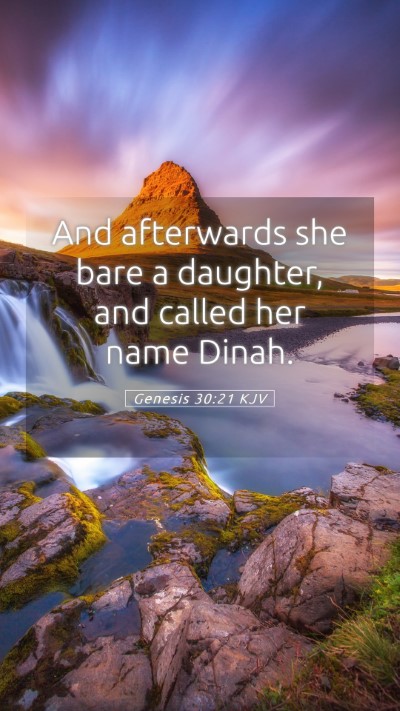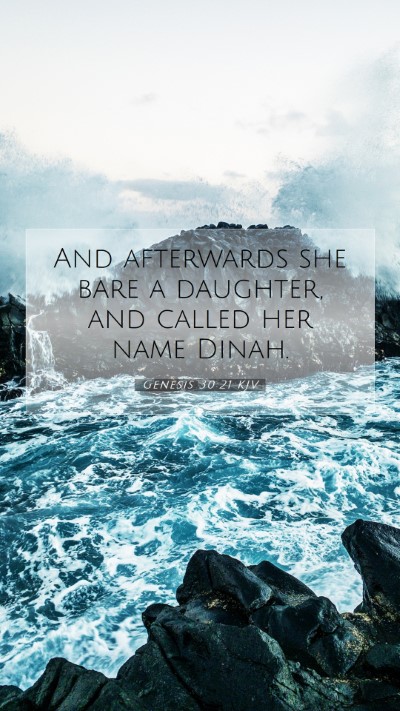Understanding Genesis 30:21
Verse Reference: Genesis 30:21 - "And afterward she bore a daughter and named her Dinah."
Overview of Genesis 30:21
This verse narrates the birth of Dinah, the daughter of Jacob and Leah, following a series of birthings among Jacob's children. Its context in the narrative deals with the familial dynamics and the spiritual significance of Leah's children.
Bible Verse Commentary
Commentators like Matthew Henry, Albert Barnes, and Adam Clarke provide invaluable insights into the meaning of this verse. They highlight the cultural, spiritual, and relational implications of the birth of Dinah. Here’s a summary of their interpretations:
Matthew Henry's Commentary
Matthew Henry emphasizes the specific mention of Dinah's birth as significant among the male progeny of Jacob. Henry points out that God’s providence is seen in Leah's fruitful years, showcasing that both her joys and her disappointments were all part of God’s divine plan. He interprets Leah's actions as a reflection of her desire for Jacob's love and approval.
Albert Barnes' Commentary
Albert Barnes offers an observation about the rectitude and justice in the naming of Dinah. He notes that her name means “judgment,” which reflects Leah’s position in relation to her sister Rachel and Jacob. Barnes also reflects on the broader implications of Dinah's birth concerning the future of the Israelite nation and the tribes that would descend from Jacob.
Adam Clarke's Commentary
Adam Clarke elaborates on the impact of this single birth by linking it to the social and moral fabric of Jacob's family. Clarke remarks on how Dinah's birth would eventually lead to crucial events in Genesis, including her story and her brothers’ reactions to her situation, which are pivotal in the history of Israel. He reflects on her role as a daughter, a figure of mercy, and a representation of the female lineage in Jacob's family.
Historical Context
Understanding the historical and cultural context of Genesis 30:21 aids in uncovering deeper meanings. During this period, family lineage and relationships were central to Hebrew identity and societal structure. The personal dynamics between Leah, Rachel, and Jacob are a microcosm of the broader themes of conflict, competition, and divine favor that appear throughout Genesis.
Application of Genesis 30:21
This verse prompts reflection on familial relationships and the significance of each family member. As such, Genesis 30:21 can be applied to modern family dynamics, emphasizing that every member of a family holds intrinsic value before God. Leah's longing for affection is relatable to many who seek love and approval within their own families.
Cross References
- Genesis 29:32 - Leah’s firstborn son, Reuben.
- Genesis 30:9 - Leah’s maid Zilpah bears children.
- Genesis 34 - The story of Dinah and the Shechemites.
Conclusion
Genesis 30:21, while seemingly straightforward, opens discussions on biblical themes of motherhood, competition, and God’s overarching plan. Its study reveals how the personal stories in the Bible reflect universal truths about human relationships and divine involvement.
Further Study on Genesis 30:21
If you're interested in delving further into the Bible verse meanings or looking for Bible study resources, consider the following:
- Bible study guides focusing on the Book of Genesis.
- Online Bible study tools that facilitate deeper scripture analysis.
- Bible study lessons covering Old Testament narratives.


